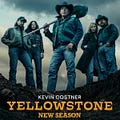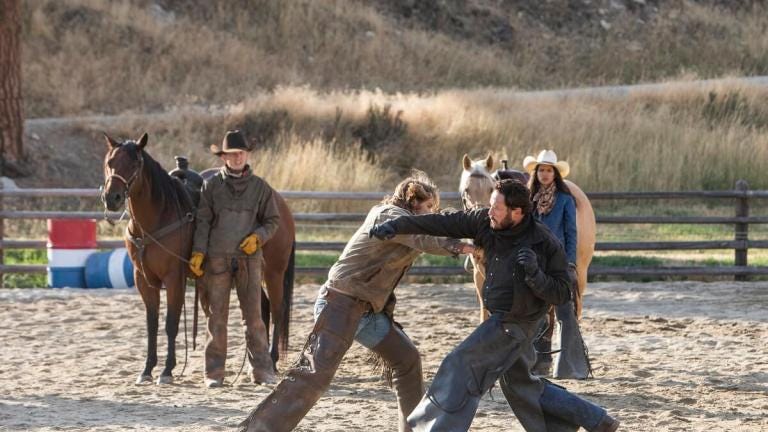This is the first of a 3 part series on Paramount TV’s Yellowstone.
It contains light spoilers.
When referring to the show’s indigenous characters, I use the term “American Indian” in the broad sense and the specific tribal name when available.
You can support JoeWrote by sharing this piece on social media and commenting with your feedback to help me improve.
My dream is to be a Cowboy; rising before dawn, living off the land, and, should I ever desire, knowing I have the freedom to saddle up and ride off into the sunset.
However, nowadays the West is more resort than ranch, so I’ve had to settle for an equally masculine pastime — blogging. Fortunately, I’ve found Paramount’s hit show Yellowstone as a good scratch for my Western itch.
If you’re unfamiliar, Yellowstone is the story of Montana ranch barron John Dutton (Kevin Costner) fighting to keep his familial ranch from being washed away in the river of modernity. Along for the ride are Dutton’s children:
There’s Beth, the Cersei Lannister of Mountain West real estate who has a terminal case of Daddy Issues.
Kacey, the cliche Cowboy who plays by his own rules, which is the rule that he must murder.
And last but certainly least, Jamie, the lawyer and black sheep of the Dutton clan, despite being the only one who isn’t a career criminal.
As the Dutton family tries to shove the square peg of a 19th-century way of life into the round hole of the 21st-century, they battle real estate developers, casino moguls, the state of Montana, and the nearby Crow tribe, all of who want to take the Yellowstone ranch from its rightful* owners. The show is well worth your time. Its got realistic characters, exciting storylines, and an exploration of the underlying social dynamics of American Capitalism.
Woven into this modern western is an exploration of America’s relationship with land, race, class, and capital, and how the intermixing of the three create dramatically different realities for different groups of Americans.
This is the first of a three-part series.
Part 1 — LAND
“You’re the Indian now.”
One thing Yellowstone does exceptionally well is remind the audience that the show is set on stolen land. American Indians feature prominently in the story, as the Crow reservation offers a gloomy contrast to the Yellowstone’s wealth.
There’s an underlying irony in Dutton’s quest to stop the very thing his ancestors did from happening to him, which creates compelling characters as the Duttons, who are clearly in the wrong try to convince themselves they’re in the right. To overcome this contradiction and maintain ownership of “the largest ranch in Montana,” the family uses a variety of legal and illegal means, such as:
Murder
Political corruption
Lawsuits
Wage slavery
Literal slavery
Child labor
The co-opting of police forces for personal gains
Infiltration of the government
Intimidation of journalists
Police brutality on peaceful protestor,
And good-old-fashioned frontier justice! (Hanging a guy for building a hotel nearby.)
The justification for all this is that it is their land, and they will do anything to protect it. Obviously, this is massively hypocritical coming from the people who stole the land, though, in fairness to the Duttons, a good portion of actual American industry was built the same way.
As the family fights the encroaching forces, issues of land rights, ownership, and eminent domain all come into play, highlighting the fact that the Duttons’ claim to the land rests on an immoral and rather unnatural notion of property rights. Dutton only owns the land because his ancestors were lucky to “find” it at a certain time (1883) and be a certain demographic (white). Had they come a bit later, another family would’ve already staked it. Had the Duttons been a different race, they wouldn’t have been allowed to own it. And had U.S. law not deemed American Indians subhuman, the land would’ve remained the property of the Crow.
It wasn’t ingenuity of innovation that built John Dutton’s fortune, but rather an abhorrent set of legal, social, and economic conditions, the legacy of which still last today.
And while the Duttons have no natural right to the ranch (they’re neither its original inhabitants nor the ones who create its value), they live alongside and trample over those who do. Both the American Indians who inhabited the land before the Dutton family drove them from it, and the workers who risk life and limb to derive its value, are subservient to the “legal” owners. They never see a dime of profit. Instead, the Natives get destitution and ethnic cleansing while the ranch hands get concussions and $400 a week.
Yellowstone is just a show (and a damn good one at that), but one doesn’t need to look far to find real-life instances of the legacy of manifest destiny colonialism it depicts. From racial wealth gaps, to income inequality, to the staggering rates of sexual assault of Indian women, the impacts of the very land system John Dutton represents are all around us.
Next time we’ll look at the show’s depiction of Race & Class. Subscribe so you don’t miss it.
What are your thoughts on Yellowstone? Let me know in the comments below.
Parts II & III of this series can be found here:






I love this show. It shows various perspectives.
I can't bring myself to watch the show, given everything you've described here. After reading Wounded Knee by Heather Cox Richardson, I find these stories about white men/women building dynasties just disgusting. I did watch one episode, and couldn't stomach it.